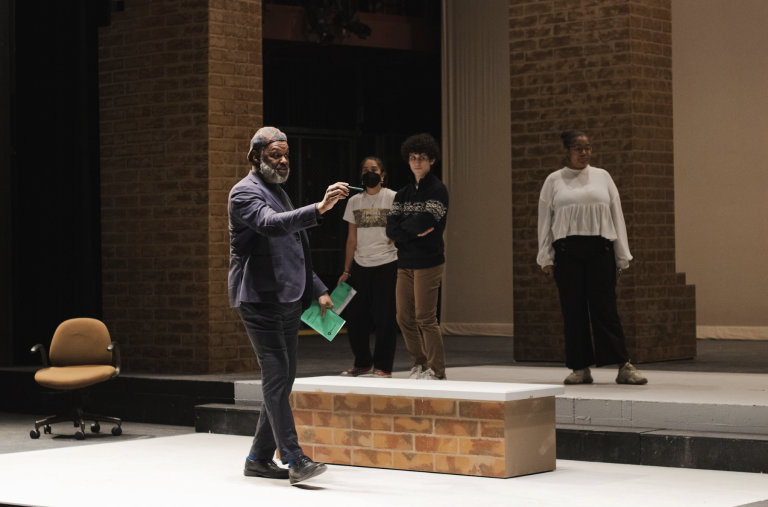John Hunt ’26
Staff Writer
This week, 18 years ago, journalist Hunter S. Thompson ended his own life at age 67 inside his home outside Aspen, Colorado. It was an abrupt end to the wild and winding life of a man who was a pioneer in journalism and prided himself on doing it his own way. That’s a dark way to start, but the anniversary of his death does give us a reason to talk about him. He has been gone for some time now, and it’s important not to let his work fade into the sands of time, so, I’d like to direct your attention to—perhaps even persuade you to read—possibly his greatest work, Fear and Loathing in Las Vegas.
Why read a book from 1971? One reason is that, at least in my opinion, it is one of the funniest and most entertaining books you can read. It is a massive, drug-addled adventure across the California desert and 1970s Las Vegas, a cynical satire of American culture, and as Thompson puts it a “gross, physical salute to the fantastic possibilities of life in this country.” You’re likely to be equal parts amused and repulsed—it is decidedly dated. However, if you are into the thrills of Las Vegas, battling psychedelic hallucinations, absurdity, and pushing yourself the absolute limit all in pursuit of the American Dream, then this may be for you. There’s no intellectual heavy lifting required to read the direct prose, and even if you normally hate reading, you’ll probably still find it interesting or provocative. But why is it relevant? I find it to be prescient, or, more accurately, it contains some strangely prophetic and relatable scenes. Here are two examples:
1) An anecdote: Raoul Duke (a stand-in for Thompson) and his lawyer Dr. Gonzo (based on Thompson’s real life lawyer Oscar Zeta Acosta) find themselves at the National District Attorneys Conference on Narcotics and Dangerous Drugs. They find an unassuming cop from rural Georgia at the bar. In a scene not unimaginable today, they decide that it’s time to put on a show—because why not. Posing as cops from Los Angeles, they convince the man, who is already afraid of the mere idea of a city, that the city is overrun with “satanists,” “lizard people,” “criminals,” and “junkies”—some of whom engage in cannibalism and human sacrifice. That is a large amount of 2020’s online conspiracy theory culture all distilled in a fictional bar encounter in 1971. Jokingly, one could ask if they got their ideas from this book. Their new friend from Georgia is both completely convinced and horrified and leaves the bar even more afraid than before. A person from a rural area believing that LA is a den of iniquity based on spurious claims by random people feels very current indeed.
2) Journalism is a focus of the novel’s ire. Duke makes fun of himself, once shouting loudly at a hitchhiker that no one respects a “Doctor of Journalism” anymore. To poke fun at the self-serious nature of journalism and the general lack of respect for journalism itself are both common today. Beyond that, Thompson drives home his ethos about journalism and his disdain for the way legacy media operates. He advocates for a more subjective kind of journalism, one that picks a side and does not pretend to feign objectivity. It was relevant in Thompson’s own time and in ours as well. Thompson hated Richard Nixon (I would suggest reading Thompson’s obituary of Nixon as well) and said that it was impossible to be objective about Nixon and the Vietnam war. The struggle to cover politics and news itself objectively is still as pressing as ever. Perhaps Thompson’s want for more subjective journalism has been achieved, at the very least in TV media. There has never been a greater time for subjectivity, partisanship, and opinion-driven reporting. Is that what Thompson had in mind, or did he simply want something more thoughtful and honest instead of a direct distillation of what “official sources” say? I can’t say for sure, but I would say that his renegade form of journalism has gone somewhat mainstream.
There are many other strange moments—some of which remain relevant and others not. There is an accidental kidnapping, armed robbery, many more drugs, near suicide, and, as Thompson put it, “savage violence”: You will have to read the novel to find out about those. You still might be thinking to yourself, “when will I have time to read a book?” The last reason I can give to you is that it is barely 200 pages, so it won’t take more than a day or two to get through. I can almost guarantee that once you start reading, much like the large quantity of drugs Duke and Dr. Gonzo ingest, it pulls you by the collar and doesn’t let go.







+ There are no comments
Add yours